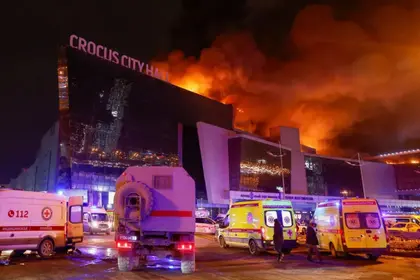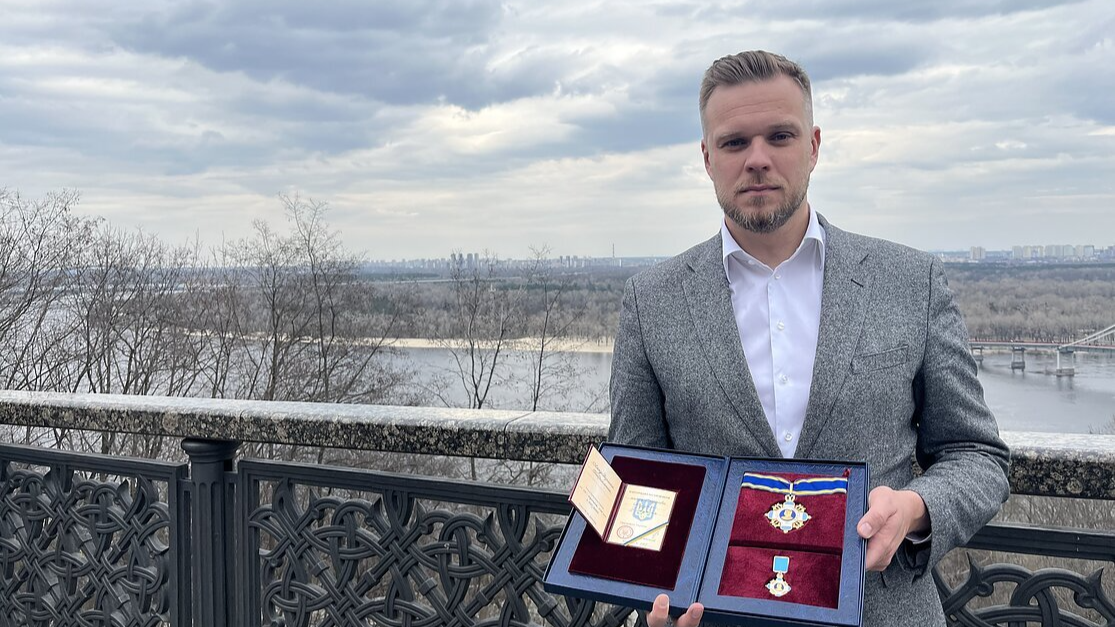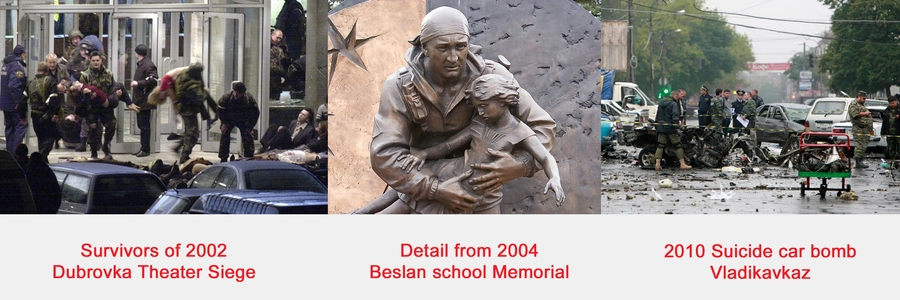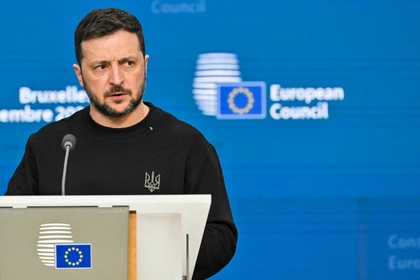In the five days since gunmen killed at least 139 people, the deadliest terrorist attack on Russian soil in 20 years, the evidence continues to mount that the dreadful March 22 attack on Moscow’s Crocus City Hall was planned, orchestrated, and carried out by the so-called Islamic State-Khorasan (IS-K) militants.
Despite the evidence, Vladimir Putin and his sidekicks – Nikolai Patrushev, Secretary of Russia’s Security Council; Alexander Bortnikov, Head of the Federal Security Service (FSB); Dmitry Peskov, Kremlin Press Secretary and the rest – are intent on pointing the finger at Ukraine.
JOIN US ON TELEGRAM
Follow our coverage of the war on the @Kyivpost_official.
“Extremists have imminent plans to target large gatherings in Moscow, to include concerts.”
Bortnikov went as far as to say, without evidence, that the US, UK and Ukraine were behind the attack, with Kyiv providing an escape window for the suspects. Kyiv, Washington and London have categorically and angrily denied all accusations.
Not only did the nature of the attack and its target match US warnings on March 7 “that extremists have imminent plans to target large gatherings in Moscow, to include concerts,” but IS-K claimed responsibility which they backed up by publishing what appeared to be genuine bodycam footage of the attack as it took place on the ISIS-affiliated news agency Amaq.
Even though Putin acknowledged during a televised meeting on Monday that “we know the crime was committed by radical Islamists,” he went on to say that the US was trying to persuade the world that it was an attack by ISIS acting alone, with no link to Ukraine.

Putin Ready for Talks with Trump ‘Any Time’ to End War in Ukraine
He insisted he knew better: “The question that arises is, who benefits from this?” he said. He then said that the terrorist attack was just another link “in a whole series of attempts by those who have been at war with our country since 2014, by the hands of the neo-Nazi Kyiv regime.”
Maria Zakharova, Russia’s Foreign Ministry Spokeswoman, seemed signed up to Shakespeare’s aphorism in Hamlet that “methinks thou dost protest too much,” saying during a Sputnik radio broadcast on Wednesday, March 27: “The very fact that within the first 24 hours, even before the fire was put out, the Americans started screaming that it wasn’t Ukraine, I think, is a piece of incriminating evidence. I can’t classify it otherwise; it is evidence in and of itself.”
But not everyone on Putin’s side agrees. According to Bloomberg, four unnamed sources say hardly any of Moscow’s elite who are “in the know” share his claim that Ukraine was involved in the attack but were more shocked by the failure of the security services to prevent the massacre.
One source said that Putin was present at a meeting where it was made clear that there was no connection to Kyiv. Despite seeming to accept that, he seems determined to keep pushing the claim and to use the tragedy to whip up anti-Ukrainian feeling.
The claims that the fugitive gunmen were heading for Ukraine were also undermined when Belarus President and Putin ally, Alexander Lukashenko, said the terrorists initially tried to flee to Belarus. He is quoted in Wednesday’s Daily Telegraph as saying that he ordered the level of security on his border so that the terrorists “turned away and went to the section of the Ukrainian-Russian border.”
Keir Giles, a Russian expert at the UK’s Chatham House Institute of International Affairs, the author of “Russia’s War on Everybody: And What It Means for You,” dismissed Putin’s attempt to link the attack to Ukraine. He said Russian references to a “window” on Ukraine’s front line are “a fairy story.” That would require Russian forces let them through a heavily fortified and mined war zone.
Russian references to a “window” on Ukraine’s front line are “a fairy story.”
Why is Putin determined to blame Ukraine?
Putin is fixated on Ukraine and has been for all of his presidency and before. His views were encapsulated in his 2012 article “On the Historical Unity of Russians and Ukrainians.”
He refuses to accept the verdict of the Cold War and has an all-consuming resentment that he came to power in a Russia that had lost prestige and suffered from what he perceived as geopolitical injustices. His imperial ambitions have led to Putin’s increasingly public obsession with Ukraine, whose very existence embodies his many historical grievances.
His 2022 so-called special military operation was intended to sweep away Ukraine’s government and bring Kyiv back into a new Russian-led “empire.” The failure of that enterprise has made his paranoia and hatred of his national opponent ever more acute.
Why has there been all this rhetoric about the war in Ukraine, when in actual fact there are other dangers much closer to home?”
If he can convince Russians that Friday’s atrocity emanated from Ukraine then he may feel that will give him even more latitude to carry on his war, including further mobilization or even more drastic action – the threat of the use of tactical nuclear weapons is frequently hinted at by Putin and, especially, Dmitry Medvedev the former president and current Deputy Chairman of Russia’s Security Council.
The second motive is the apparent failure of Putin and his security apparatus, which has always been viewed as his strength, in maintaining order and the security of the nation. Speaking to NBC News, John Lough, another Chatham House expert, said the massacre will be deeply embarrassing to the regime and could lead to a weakening of his apparently unending rule.
Lough said: “It certainly doesn’t strengthen him. Within the elite itself, there are going to be questions about where the focus has been: Why has there been all this rhetoric about the war in Ukraine, when in actual fact there are other dangers much closer to home?”
Putin said at the Monday video conference: “Are radical and even terrorist Islamic organizations really interested in striking Russia, which today stands for a fair solution to the escalating Middle East conflict?”
The question ignored Islamic State’s longstanding enmity towards Russia, in general, and Putin, in particular.
Putin has a long history of ruthlessly putting down Islamist insurgencies at home and abroad – and boasting about it. During a visit to Syria in 2017, where he supported President Bashar al-Assad in the civil war, he declared that Russia had achieved “total victory” over ISIS.
As a result of Russia’s ruthless Syrian campaign and the way it crushed Chechnya in the early 2000s, ISIS has long considered Russia a target, according to Mark Galeotti, an honorary professor at University College London.
“ISIS-K has long actually regarded Russia as being one of its main enemies,” Galeotti said during a Sunday podcast, adding that while ISIS considers the US to be the Great Satan, Russia is seen as the Lesser Satan.
Commenting on Putin’s March 19 public dismissal of the US warnings as “an attempt to frighten and destabilize our society,” the veteran Russia analyst Anatol Lieven said to the Washington Post that the US may oppose Russia in every sphere but “Washington never killed a single Russian citizen [in the last 30 years].”
ISIS considers the US to be the Great Satan Russia is seen as the Lesser Satan.
In that time, he said, “Islamist terrorists have killed hundreds of Russian citizens, at Vladikavkaz in 1999, 2008, and 2010; the Dubrovka theater in Moscow in 2002, the Beslan school in 2004, and now again in Moscow.”
For a regime that has staked much of its credibility and political future on the war in Ukraine, Putin and his Kremlin allies are trying to switch the focus from the intelligence and security failures that led to the Crocus City catastrophe. The only way to do that is to lay the blame on Kyiv’s doorstep and build on the momentum to ensure it is punished.
Medvedev, along with the rest of Putin’s “cabal” has vowed sweeping punishments, saying the suspects should be executed. “But it is much more important to kill everyone involved. Everyone,” he said. “Those who paid them, who sympathized with them, who helped them. Kill them all.” He said so leaving little doubt about whom he considered “them” to be.
If the regime’s public statements, which seem to dismiss the notion that Islamic fundamentalism poses a real and present danger, are what they truly believe, then they could be making themselves vulnerable to further attack from that direction.
However, should they privately realize the truth, then based on the history of how Putin deals with internal threats the probable resulting crackdown on the huge immigrant Islamic workforce, on which much of Russia’s industry relies, could drive them into the arms of the fundamentalists and increase support for ISIS in Russia and the Central Asian republics.
That would be a true test of the Kremlin’s leadership and perhaps a better barometer of Putin’s true popularity than this month’s stage-managed elections.
You can also highlight the text and press Ctrl + Enter










